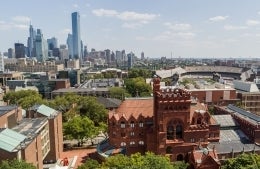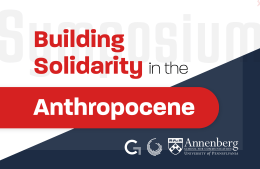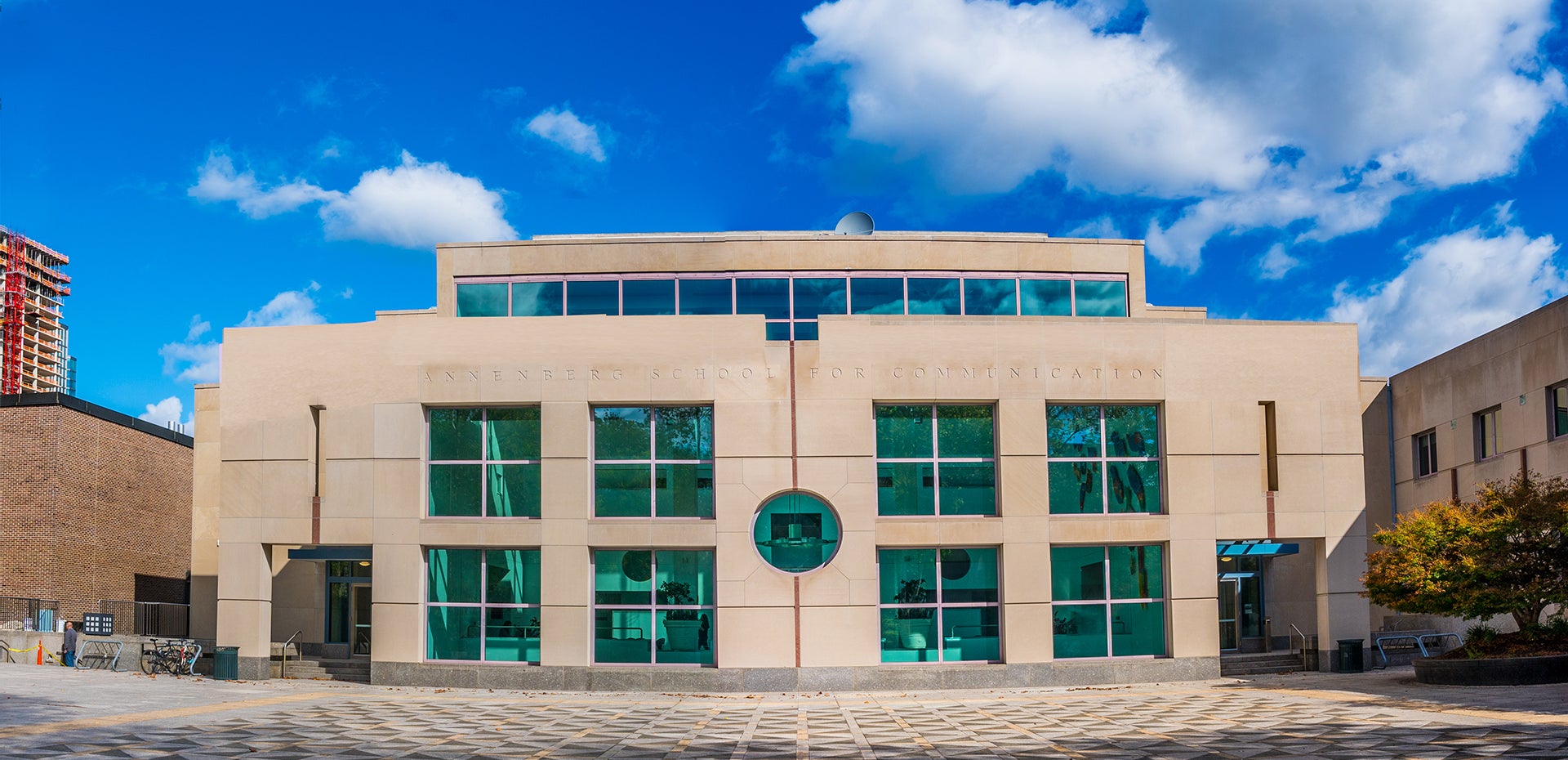Category
All Categories Alumni Call for Submissions Faculty News Graduate Student News In Memoriam News Presentations Research Undergraduate News
Research Area
All Areas Culture & Media Global Communication Health Communication Media Institutions Political Communication Science Communication Technology & Society
Center or Group
All Centers & Groups Addiction, Health, & Adolescence (AHA!) Lab Annenberg Center for Collaborative Communication Annenberg Creative Annenberg Extended Reality Lab Annenberg Public Policy Center Annenberg School for Communication Library Archives CAMRA Center for Advanced Research in Global Communication Center for Experimental Ethnography Center for Information Networks and Democracy Center for Media at Risk Center on Digital Culture and Society Communication Neuroscience Lab COMPASS Computational Social Science Lab Health Communication & Equity Lab Institute for Public Service Institute for the Study of Citizens and Politics Media, Inequality & Change Center Milton Wolf Seminar on Media and Diplomacy Network Dynamics Group Peace and Conflict Neuroscience Lab Polarization Research Lab SAFELab Social Action Lab
Person
All People Aaron Hyzen, Ph.D. Adetobi Moses Alex Tolkin, Ph.D. Alvin Zhou, Ph.D. Alyssa (Allie) Sinclair, Ph.D. Amy Gutmann, Ph.D. Anastasiya Miazhevich Andrew A. Strasser, Ph.D. Andrew Williams Andy Tan, Ph.D., M.P.H., M.B.A., M.B.B.S. Anjali DasSarma Anna Gamarnik Anna Murphy Anthony Resnick Arelí Rocha Ariel Schwartz, Ph.D. Assil Frayha Aswin Punathambekar, Ph.D. Aviv Landau, Ph.D., M.S.W. Azsaneé Truss, Ph.D. Baird Howland, Ph.D. Barbie Zelizer, Ph.D. Ben Muzekari Benjamin Todd Jealous Bianca Zamora Perez Billy Pierce Bita Fayaz-Farkhad, Ph.D. Brendan Mahoney, Ph.D. Brittany Zulkiewicz Calvin Isch Cameron Moy Carolyn Marvin, Ph.D. Cecilia Rabayda Chloe (Jae-Kyung) Ahn Christiana Dillard Christine Huang Christine Phan Cienna Davis Collin Kather Craig Snyder Damon Centola, Ph.D. Damon J. Phillips, Ph.D. Dan Romer, Ph.D. Dan Romer, Ph.D. Danaé Metaxa, Ph.D. Daniel J. Hopkins, Ph.D. Danielle Bassett, Ph.D. Danielle Clark, Ph.D. Danielle Cosme, Ph.D. David Eisenhower, J.D. David Grazian, Ph.D. David Lydon-Staley, M.F.A., Ph.D. David S. Cordero Deen Freelon, Ph.D. Desmond Upton Patton, M.S.W., Ph.D. Devo Probol Diana C. Mutz, Ph.D. Diego A. Reinero, Ph.D. Dolores Albarracín, Ph.D. Donovan Schaefer, Ph.D. Duncan J. Watts, Ph.D. Duru Su Kadıoğlu Elaine Hanby Elaine Hanby Emilie Grybos Emily Falk, Ph.D. Emily Hund, Ph.D. Ennuri Jo, Ph.D. Erin Walk, Ph.D. Eszter Zimanyi, Ph.D. Eszter Zimanyi, Ph.D. Eszter Zimanyi, Ph.D. Eury Hong Farrah Rahaman Feng Yi Chew Gabriella Bellot Gayoung Jeon Guobin Yang, Ph.D. Harry Hudome Hendrik Theine, Ph.D. Hogeun Lee Ify Okpali Ingrid Burrington j. Siguru Wahutu, Ph.D. Javier Garcia-Perez, Ph.D. Javier Granados Samayoa, Ph.D. Jeesung Ahn Jeff Pooley, Ph.D. Jennifer Rothman Jenny Lee Jessa Lingel, Ph.D. Jessica Fishman, Ph.D. Jessica McDonald John B. Jemmott III, Ph.D. John Cheney-Lippold, Ph.D John L. Jackson, Jr., Ph.D. Joseph N. Cappella, Ph.D. Joseph Turow, Ph.D. Juan Llamas-Rodriguez, Ph.D. Julia Cope Julia Ticona, Ph.D. Julian Quiros, Ph.D. Kallahan V. Brown Kate Okker-Edging Katerina Girginova, Ph.D. Kathleen Hall Jamieson, Ph.D. Katie Rawson, Ph.D. Ken Winneg, Ph.D. Ken Winneg, Ph.D. Kevin B. Johnson, M.D. Kim Woolf, Ph.D. Kinjal Dave Kirsten O. Lydic Kyle Cassidy Laetitia Mwilambwe-Tshilobo Lauren Hawkins Lauren Tokos Libby Jenke, Ph.D. Litty Paxton, Ph.D. Liz Hallgren Lizzie Martin Lucila Rozas Lucy March, Ph.D. Man-pui Sally Chan, Ph.D. Mariela Morales Suárez, Ph.D. Marjorie Margolies Matt Parker, Ph.D. Matthew Brook O'Donnell, Ph.D. Matthew L. Conaty Matthew Levendusky, Ph.D. Maya Enisman, Ph.D. Melissa B. Skolnick-Noguera, Ph.D. Mengyang Zhao Michael E. Mann, Ph.D. Michael X. Delli Carpini, Ph.D. Minjae Seo, Ph.D. Monroe Price, J.D. Murali Balaji, Ph.D. Naana Obeng-Marnu Natasha Williams Neil Fasching Nelanthi Hewa, Ph.D. Nicholas Dias, Ph.D. Nicole Cooper, Ph.D. Nidah Mohammed Nolan Siegel Omaya Torres-Grillo Oscar H. Gandy, Jr., Ph.D. Ovidia Stanoi, Ph.D. Patrick E. Jamieson, Ph.D. Qijia Ye R. Lance Holbert, Ph.D. Ran Wang Rehan Mirza Robert C. Hornik, Ph.D. Rosemary Clark-Parsons, Ph.D. Sam Frederick, Ph.D. Sam Wolken Samantha Dodd Summerbell, C.A. Sandra González-Bailón, Ph.D. Sanjay Jolly Sara Reinis Sarah Banet-Weiser, Ph.D. Sarah J. Jackson, Ph.D. Sarah Ropp, Ph.D. Shana Kleiner, L.M.S.W. Shane Sheehy Shawn Patterson Jr., Ph.D. Shengchun Huang, Ph.D. Silvia Téliz Sim Gill Sima Kokotović, Ph.D. Siva Mathiyazhagan, Ph.D., M.S.W. Sophie Maddocks, Ph.D. Sophie Maddocks, Ph.D. Staci Jones, Ph.D. Stella Juhyun Lee, Ph.D. Stephanie Rivera-Kumar Sydney L. Forde, Ph.D. Tal Orian Harel Talia Fiester Taurean Butler Taylor L. Smith Tejas Harad Thandi Lyew Thomonique Moore Tian Yang, Ph.D. Timothy Dennys Steven Dorr Tom W. Etienne Tukufu Zuberi, Ph.D. Tyler Leigh, Ph.D. Valentina Proust Victor Pickard, Ph.D. Vincent Price, Ph.D. Vishwanath E.V.S. Waldo Aguirre Wei (David) Wang Xinyi Wang, Ph.D. Yifei Lu Yiheng Zhang Yijing Chen, Ph.D. Ying Zhang Yingchuan Qu Yphtach Lelkes, Ph.D. Yuan Xu Yuzhe (Julian) Lei Zane Griffin Talley Cooper Zehra Husain, Ph.D. Zhe Wang, Ph.D.
Topics
All Topics Activism & Social Justice Attitudes & Persuasion Behavior Change Big Data Data Privacy Digital Culture Film & Mediamaking Gender & Sexuality Gig Economy International Media Journalism Media Effects Media History Media Policy Networks Neuroscience Partisanship & Polarization Peace & Conflict Politics & Elections Public Health Race & Ethnicity Social Media Tobacco & Substance Abuse Visual Communication











